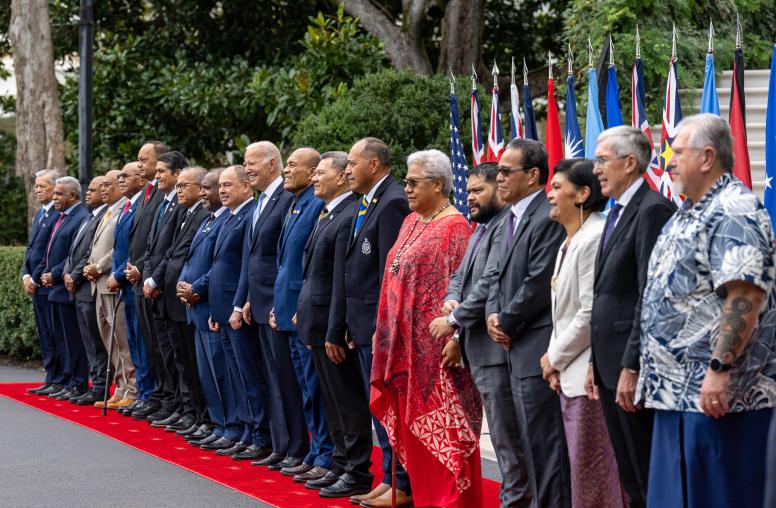Can We Make Peace with the Coronavirus?
‘Environmental peacebuilding’ offers an approach to mobilizing conflicting parties against COVID.
As humanity struggles to confront the coronavirus pandemic, we face no greater obstacle than the violent conflicts worldwide that prevent many communities and nations from the necessary task of working in unison. Is it conceivable to have Israelis and Palestinians working cooperatively to contain the virus, or the opposing sides in bitter conflicts from Afghanistan to Yemen? It is not only conceivable, a practical model for achieving this cooperation is available in the work of environmental peacebuilders—visionary groups that have been working across the lines of conflict to confront the universal threat of climate change.

The field of environmental peacebuilding understands the degradation of our planet’s environment as a common human foe against which groups divided by conflict can be mobilized. “Nature knows no political borders,” notes the Arava Institute for Environmental Studies, which brings together Israelis and Palestinians to address water scarcity in their shared ecosystem. USIP has supported Arava’s work with youth from the two sides through a grant.
Climate change has been the most global, but not the only, challenge that opens paths for communication and cooperation among groups in conflict. Natural disasters have done so. The 2005 earthquake in Pakistan’s Kashmir region prompted violent extremist groups there to halt attacks on neighboring India and instead support relief work in parallel with Pakistani government and U.S. military efforts. The 2004 Indian Ocean tsunami helped lead Indonesia’s government and separatist guerrillas to halt and resolve the insurgency in the region of Aceh.
Where disasters are more likely to trigger violence is in societies that exhibit widespread ethnic exclusion from political power and that have overall lower levels of human development. This represents a sobering challenge as COVID-19 rapidly spreads into fragile states across the developing world.
Environmental, and Public Health, Peacebuilding
The tenets of environmental peacebuilding can be used against COVID in conflict zones, facilitated by what public health institutions call “global health diplomacy.” In the face of pandemics, global health diplomacy promotes human security more holistically, for example by negotiating a halt to hostilities when disease is spreading. Appeals in this direction have been made, notably U.N. Secretary General António Guterres’ call for a global cease-fire.
At local levels, the urgency of the COVID threat might help boost public support for peacebuilding efforts that begin with public health needs of communities, and that might later be extended to work on longer-term, environmental approaches. In regions of water scarcity—especially in vulnerable locales such as refugee camps or settlements of displaced people—peacebuilders might seek détente from conflicting parties to improve “water, sanitation and hygiene” (or WASH) infrastructure that urgently is needed to confront the pandemic.
The COVID pandemic and climate change together demand a response in vulnerable states burdened by both crises. Recent cycles of drought in Burkina Faso are expected to triple the population there facing food insecurity—to 2.1 million people. That insecurity is now deepened as COVID’s effects slow food exports from India and France. Climate-induced food insecurity becomes a driver of conflict particularly when it is combined—as in Burkina Faso and across the Sahel—with the violence of extremist groups that exploit the weak governance of fragile states.
Practical Obstacles
While the COVID pandemic offers an opportunity to gather conflicting sides against a common foe, the pandemic raises the same kinds of immediate, practical obstacles for peacebuilding as for every domain of life. With social distancing the immediate "go-to" response for tackling COVID-19, how effectively can online relationships build peace based on environmental issues? Colombia and sub-Saharan Africa struggle with access to cellular data and reliable internet in rural areas. Other areas, including even remote regions of Afghanistan have better telecommunications infrastructures that can be used to enhance community resilience.
USIP, its partners in disparate conflict zones and other peacebuilding groups are grappling with ways to work around the sudden new obstacles. European-based nongovernment organizations this month consulted hundreds of local peacebuilders worldwide and found that in some cases COVID’s impact is exacerbating conflict or violence. Local peacebuilders worry that international leaders and funders will not be able to sustain their recent levels of engagement, despite the obvious need for more cross-sectoral peacebuilding initiatives that benefit both the environment and public health.
Amid the search for concrete solutions to the new, everyday problems, environmental peacebuilders also find COVID reinforcing their message. On the seam of the Israeli-Palestinian conflict, where Arava and its allies work, the Israeli director of EcoPeace Middle East, Gidon Bromberg, noted the joint message of COVID and climate change: “The science of ecology and biology is there to remind us that we can never disengage from a shared environment.”
Erica L. Sheeran is a research assistant for USIP’s Grants & Fellows program.



